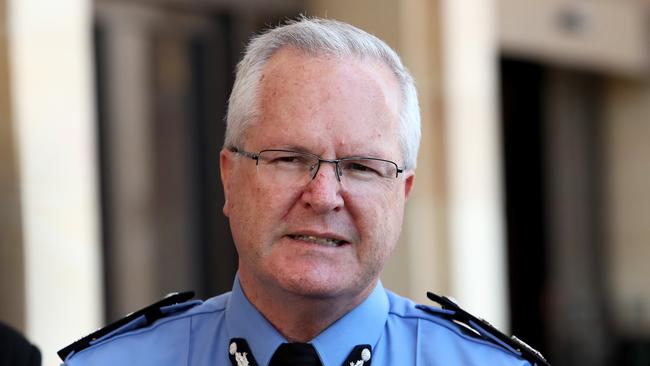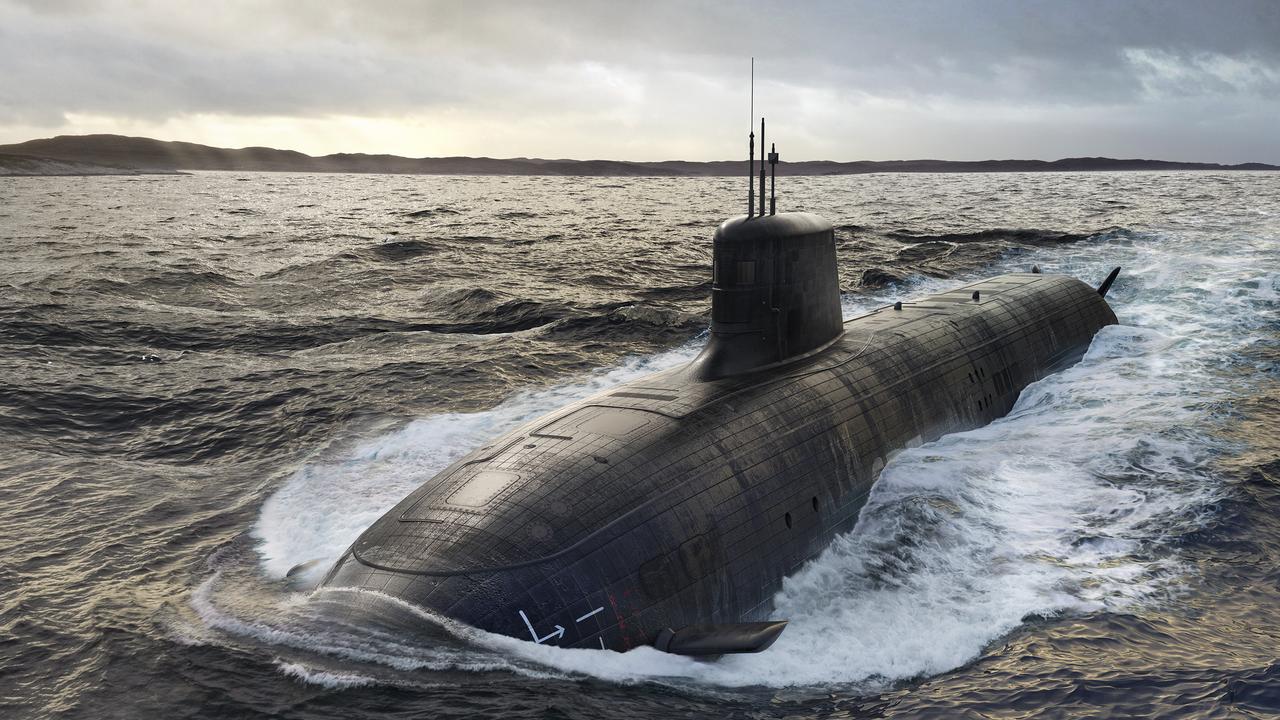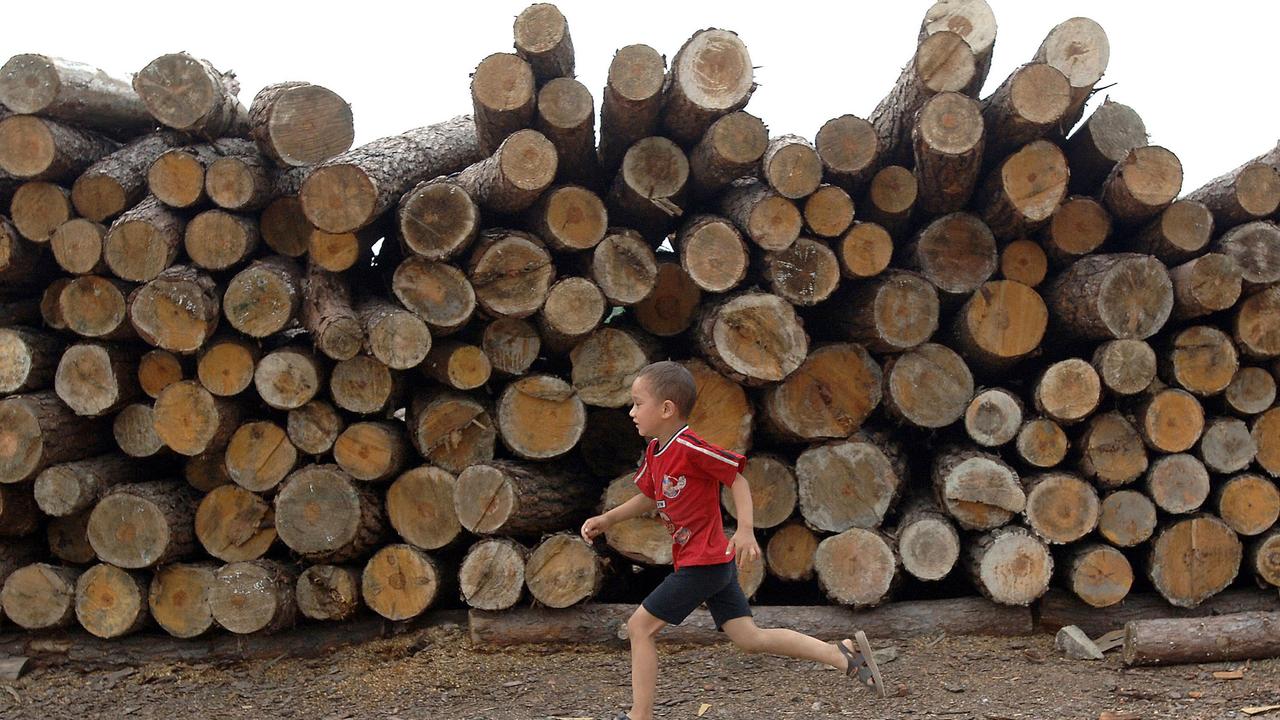Police push for remote booze ban in WA
The nation’s most severe restrictions on the sale of alcohol would be imposed across the entire northwest of Australia under a secret proposal by police.

The nation’s most severe restrictions on the sale of alcohol would be imposed across the entire northwest of Australia — including in the tourist hubs of Broome and Kununurra — under a secret proposal by police, who consider the region in unprecedented crisis.
West Australian Police Commissioner Chris Dawson, who oversaw an investigation into child abuse and domestic violence in remote Aboriginal communities as head of the Australian Criminal Intelligence Commission, is on a collision course with the McGowan Labor government and the Australian Hotels Association over how to protect children from alcohol-related harm in the Kimberley.
After consulting frontline workers and indigenous leaders, Mr Dawson has asked the WA Director of Liquor Licensing for a radical crackdown on bottleshops in every town in the region.
For seven months, the director has been contemplating a police proposal that The Australian has been told could ban bottleshops across the region from selling anything but light beer. Full and mid-strength alcohol, including wine and spirits, would be confined to restaurants, pubs and other licensed premises.
In a previous debate over alcohol-related harm in the state’s iron ore region, WA Premier Mark McGowan made it clear he preferred a banned-drinkers register over blanket restrictions, an approach favoured by the AHA.
Such a register has been in place in the Northern Territory since 2017 and is designed to block known problem drinkers at the point of sale.
The Australian was denied seeing Mr Dawson’s report to the state liquor licensing director under Freedom of Information laws, but the commissioner confirmed WA Police had asked the director to impose restrictions across the Kimberley under the state’s liquor act.
“This application has been made as a result of ongoing concerns regarding the harms of excessive alcohol consumption across the Kimberley,” Mr Dawson said.
“These harms are significant. They impact upon law and order in the community in addition to the health and welfare of community members, and can only be addressed through a combined whole-of-government and community effort.”
Senior Aboriginal man Ian Trust, executive chairman of the Kununurra-based Wunan Foundation, said alcohol abuse was so rife in the east Kimberley that it was beginning to damage the economy. “If the community is not safe, nobody wants to live there,” he said. “We have had that many businesspeople come to us wanting to sell out.”
Mr Trust said the effect of alcohol abuse was devastating for children in Kununurra. About 70 local children — most of them indigenous — were periodically in trouble with police for crimes they committed in small groups while roaming at night, he said.
Home was often not safe for these children, Mr Trust said. One boy recently cried on his cell floor at the Banksia Hill Juvenile Detention Centre in Perth when told he was going home to Kununurra; he wanted to stay in jail
“He was saying nobody loves me,” Mr Trust said. “These children just think no one cares for them.”
Mr Trust said he supported a region-wide ban on the sale of full and mid-strength takeaway alcohol. “We have got to try anything,” he said. “I think people don’t realise the extent of the crisis we have in these northern towns.”
The police push comes 12 years after indigenous women of the small inland Kimberley town of Fitzroy Crossing enlisted the support of then police commissioner Karl O’Callaghan to ban the sale of full-strength takeaway alcohol.
Emergency department presentations fell 36 per cent in the first 12 months of the ban. Two years later, a ban on full-strength takeaways was rolled out to the nearby town of Halls Creek, once described by paediatrician John Boulton as “the Gaza Strip of the Kimberley” because of alcohol-fuelled violence.
A subsequent study found the world’s highest rate of foetal alcohol spectrum disorder among children born in and around Fitzroy Crossing and Halls Creek before the alcohol restrictions. The disorder, known as FASD, is lifelong brain damage caused to a developing foetus when a pregnant woman drinks.
WA Police was prompted to investigate the extent of alcohol-related crime and harm in the Kimberley after WA Coroner Ros Fogliani’s February 2019 report into the suicides of 13 indigenous children and young people in the region between 2012 and 2016. “Almost all of the children and young persons grew up in homes marred by the effects of high levels of alcohol abuse, and this was also deeply unsettling for them,” she wrote.
“For nine of the children, the level of alcohol abuse in the home compromised the ability of the parents to properly care for their children to such an extent they were informally placed into the care of other family members for extended periods.
“A number of the young persons (including four of the children) had abused alcohol or other drugs from a young age. Some of the children had presented to hospital emergency departments for treatment of alcohol-related trauma during their teenage years.
“In seven of the cases, there was significant alcohol use in the lead-up to the deaths, and at least two of the young persons had very high blood alcohol levels when they died.
“Regrettably, they were able to buy large quantities of takeaway alcohol during the day and night of their deaths.”
Mr O’Callaghan doubted severe takeaway alcohol restrictions would harm tourism in the Kimberley if sensible exemptions were made for travellers.
The Kimberley’s population was just over 34,000 at the 2016 census, which found 50.1 per cent of residents were indigenous.
“The argument is really about saving lives,” Mr O’Callaghan said. “It’s not about making sure retailers can continue to make big profits. The residents who would complain about this also want someone to clean their town up.
They don’t want people affected by alcohol lying around in parks, causing problems in public, being violent.”
The AHA objected to a police request for alcohol restrictions across the entire Pilbara in 2017 and is expected to push back hard against the latest proposal for the Kimberley. Retailers in the region are signed up to accords with police, allowing for reduced hours of sale and even snap closures.
WA Tourism Minister Paul Papalia plans to introduce a banned-drinkers register in iron ore towns south of the Kimberley, which he said could be expanded elsewhere if it were successful.
“The state government is proposing a trial of a register across the entire Pilbara,” Mr Papalia said. ‘This trial will be the first of its kind to be assessed in a completely independent fashion by the University of Western Australia.”
Yawuru leader Peter Yu favours a banned-drinkers register over restrictions that would apply to all. He considers the matter to be of high importance.
“I don’t want to be pessimistic but people have to realise what the situation is — alcohol is a major factor in the ill health, death, dysfunction, disorder and costs in this region,” he said. “Everybody has to play a role whether it be the licensees, publicans, health workers and the families themselves.”
Broome-based senator Pat Dodson is wary of restrictions that amount to prohibition. “I think people find ways to get around it,” he said. “Alcohol is like the lightning rod for all these other problems that are not being addressed. Banning it is not providing solutions to why people are drinking to excess.”
The Australian understands one reason region-wide restrictions are favoured by police is to thwart sly groggers known to buy alcohol in Kununurra and drive it 358km south to Halls Creek and sell it at hugely inflated prices.
Sly groggers are also known to buy in Broome and drive 396km east to Fitzroy Crossing. The Kimberley is connected by sealed road to the Territory in the east and the Pilbara in the west.
An editorial in the NT News in October argued that a fall in alcohol-related assaults showed some government measures were working, “but the data shows the introduction of the banned drinkers register has not reduced alcohol-fuelled violence”.




